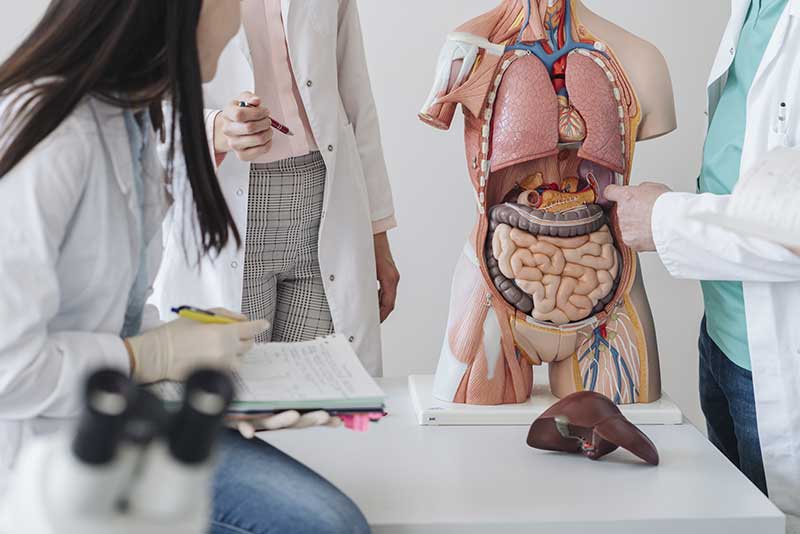Digestive health is a cornerstone of overall well-being. Your body relies on efficient digestion to absorb nutrients, fuel energy, and maintain a healthy immune system. Learning how to improve digestion can make a profound difference in how you feel daily. You are not alone if you’ve been struggling with bloating, constipation, or other digestive issues. Fortunately, adopting a few simple habits and dietary adjustments can significantly enhance your digestive function.
Understanding what happens inside your digestive system and how external factors like diet, hydration, and stress affect it is essential. This guide will walk you through proven methods to improve digestion naturally, and you’ll discover ways to boost your gut health effectively.
How to Improve Digestion
The Digestive Process
Digestion is a complex process involving several organs working together to break down the food you eat into nutrients, which your body uses for energy, growth, and cell repair. The digestive process begins in the mouth, where enzymes in saliva start breaking down food as you chew. Food then travels down the esophagus to the stomach, where powerful acids disintegrate it into a semi-liquid chyme.
Next, the chyme moves into the small intestine, where most nutrient absorption occurs. Bile from the liver and digestive enzymes from the pancreas help break down fats, carbohydrates, and proteins. Finally, the remaining waste products move into the large intestine, where water is absorbed, and the rest is prepared for elimination.
With such a complex system, it’s no surprise that various factors can influence digestion. Understanding this process is the first step in learning how to improve digestion.

Diet and Digestion
What you eat plays a critical role in your digestive health. For optimal digestion, incorporate whole foods like fruits, vegetables, lean proteins, and whole grains. These foods are packed with vitamins, minerals, and fiber, supporting a healthy digestive system.
Foods That Boost Digestive Health:
- Leafy greens like spinach and kale
- Fermented foods like yogurt, kefir, sauerkraut, and kimchi
- High-fiber fruits like apples, berries, and pears
- Whole grains such as oats, brown rice, and quinoa
- Lean proteins, including chicken, turkey, and fish
- Healthy fats from sources like avocados, nuts, and olive oil
Processed and fried foods can slow down digestion, causing discomfort and bloating. Limit your intake of refined carbohydrates and artificial sweeteners, which can irritate the digestive tract.
Fiber’s Role in Digestion
Fiber is one of the most important nutrients for digestive health. It adds bulk to stool, helping it pass through the digestive tract more efficiently, which prevents constipation. Fiber also feeds the good bacteria in your gut, supporting a healthy microbiome.
There are two types of fiber: soluble and insoluble. Soluble fiber dissolves in water, forming a gel-like substance that slows digestion and helps your body absorb nutrients. It’s found in foods like oats, beans, and fruits. Insoluble fiber, found in vegetables and whole grains, doesn’t dissolve in water and helps move waste through your digestive system.
Gradually increase your fiber intake to avoid bloating or gas, and drink plenty of water to aid fiber in its digestive journey.
Hydration and Digestion
Water is essential for the digestive system to function correctly. It helps break down food so your body can absorb nutrients and softens stool, preventing constipation. Drinking enough water ensures smooth movement of food through the digestive tract.
Aim to drink at least eight glasses of water daily, more if you’re physically active or live in a hot climate—it’sAvoid excessive amounts of caffeinated or sugary beverages, as they can dehydrate the body and disrupt digestion.
Probiotics and Prebiotics
A healthy gut is home to billions of bacteria that are critical to digestion. Probiotics, often called “good bacteria,” are live microorganisms that help maintain the balance of gut flora. Prebiotics are types of fiber that feed these beneficial bacteria.
Including foods rich in probiotics, like yogurt, kefir, and sauerkraut, can promote a healthy microbiome. Prebiotic foods, such as garlic, onions, and bananas, help stimulate the growth of beneficial bacteria, supporting overall digestive health.

Avoiding Processed Foods
Processed foods are notorious for disrupting digestion. They’re often high in unhealthy fats, sugars, and additives that can irritate the digestive tract and promote inflammation. Over time, consuming too many processed foods can lead to chronic digestive issues such as irritable bowel syndrome (IBS) or bloating.
Switching to whole, minimally processed foods can reduce the strain on your digestive system. Foods high in artificial ingredients are also often low in fiber, leading to constipation and slowed digestion.

The Importance of Chewing
It’s easy to overlook the importance of chewing your food thoroughly, but this is a critical step in digestion. When you chew properly, your food breaks down into smaller pieces, making it easier for your stomach to process. Digestion starts in the mouth, where saliva contains enzymes that begin breaking down food before it even reaches your stomach.
Chewing your food slowly and thoroughly also allows your brain to signal when you’re full, preventing overeating, which can strain the digestive system.
Stress and Digestion
The digestive system is susceptible to stress. When stressed, your body goes into “fight or flight” mode, slowing digestion as blood flow is directed away from the digestive organs. Chronic stress can lead to a variety of digestive issues, including heartburn, nausea, and IBS.
Stress management techniques like deep breathing, meditation, and regular physical activity can help reduce stress levels and improve digestion.

The Benefits of Mindful Eating
Mindful eating encourages paying attention to your food, savoring each bite, and recognizing hunger and fullness cues. This practice can improve digestion by reducing overeating and allowing your digestive system to work comfortably.
By avoiding distractions like watching TV while eating, you can focus on how much food you consume and chew thoroughly, promoting better digestion.

Common Digestive Disorders
Digestive disorders can significantly impact your quality of life. Conditions like IBS, gastroesophageal reflux disease (GERD), and celiac disease require careful management through diet and lifestyle changes.
If you’re experiencing frequent digestive discomfort, it’s essential to consult with a healthcare professional to rule out any underlying conditions. Simple changes in diet and habits can often relieve symptoms, but in some cases, medical intervention is necessary.
FAQs
How can I improve digestion naturally?
Natural methods to improve digestion include:
- Eating a fiber-rich diet.
- Staying hydrated.
- Reducing stress.
- Chewing food thoroughly.
- Incorporating probiotic and prebiotic-rich foods into your diet.
What foods are best for digestion?
Foods that support digestion include:
- Leafy greens.
- Fermented foods like yogurt and sauerkraut.
- Fiber-rich fruits like apples and berries.
- Whole grains.
Can stress affect my digestion?
Yes, stress can slow down digestion and lead to digestive issues like bloating, nausea, and IBS. Managing stress through relaxation techniques can improve digestive health.
What role does water play in digestion?
Water is essential for breaking down food, absorbing nutrients, and softening stool, helping prevent constipation and ensuring smooth digestion.
Are probiotics helpful for digestion?
Yes, probiotics promote healthy gut bacteria growth, supporting a balanced microbiome and improved digestion.
What should I avoid to improve digestion?
Avoid processed foods, excessive sugar, and large, heavy meals that can strain the digestive system.
Conclusion
Improving digestion is not just about what you eat but how you eat and live. Simple lifestyle changes, such as staying hydrated and managing stress to incorporating probiotics and chewing food properly, can have a powerful impact on digestive health. A balanced, mindful eating approach, regular exercise, and hydration will leave your digestive system running smoothly, helping you feel your best.
